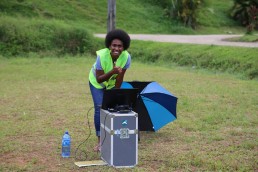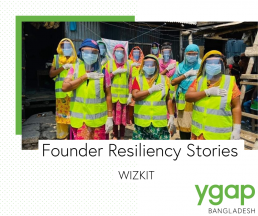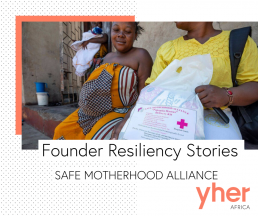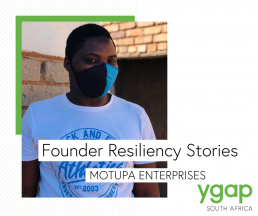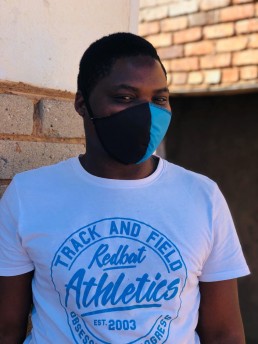Venture Recovery Stories: BridgeCap Insurance
Venture Recovery Stories: BridgeCap Insurance

60% of Kenyans don’t have access to essential healthcare services and only 40% can afford healthcare services. This is because the current existing healthcare insurance is too expensive. BridgeCap provides affordable and flexible healthcare insurance coverage for low income earners through an easy-to-use technological platform that is accessible both online and on every mobile phone.
How would you describe BidgeCap Insurance?
BridgeCap Insurance is a part of BCFS Group Limited, which also offers financing and advisory services. We are a wholesome financial hub. We provide affordable financial and insurance services to our clients. Bridgecap has three major products – SME loans/ financing, Financial Advisory services and Insurance Brokerage service.
How was the enterprise faring before the onset of the COVID-19 pandemic?
The year had started in a great way and the numbers were great. However, the COVID-19 pandemic entirely changed the shape of business. The financial advisory side of business slowed down, but the insurance side of it picked up. Currently, the insurance business is the one sustaining the enterprise.
What are some of the challenges you have faced during COVID-19, in general as an entrepreneur and as a business?
The COVID-19 pandemic has resulted in an overall reduction in the need for financial advisory services sparked off the loss of a couple of our key clients. The other clients redirected priorities to other business areas besides advisory support significantly affecting our revenues. Initially this was such a tumultuous time for our venture that every company in every industry in every corner of the country and every family was adjusting to loss of income and shifting their priorities to the basics.
How has your business changed or evolved due to COVID-19?
It is during this challenging period that we launched our flagship medical plan, Endelea Plan, which comes in three packages. Under these plans, we have Endelea Jamii to reach the people at the bottom of the pyramid; the uninsured. BridgeCap is working with them to give them financing to run businesses and in turn they can afford the small premium we charge for our cover. This is the social aspect of the business.
We have made health insurance accessible to those who cannot afford to pay in lump sum as we allow our clients to pay in installments enabling them to access world class treatment. We have also enhanced our digital platform capabilities offering our clients options to conveniently access our products and complete transactions through online portal, mobile app and USSD service.
In your own opinion, what is the most significant change that took place with your venture in the past 3 months?
New advisory client acquisition. We have been able to sign a new advisory agreement with the county government and also developed new partnership with a lead insurance company, Jubilee Insurance.
Why was this particular change the most significant to you?
These partnerships have increased our visibility and in turn we have been able to increase the venture’s impact to 350 individual clients with access to insurance cover and 30 enterprises having access to business financing.
What role has ygap played in those changes and / or what are some outcomes your venture has achieved as a result of being supported by ygap?
ygap has actively supported Bridgecap in Marketing Strategy development to increase the ventures visibility on social media. In addition, as a mentee, the external mentorship program offered by ygap has been valuable in terms of engaging mentors who are entrepreneurs as well making it easy for them to relate with some of the challenges a founder goes through and develop workable strategies surrounding these challenges.
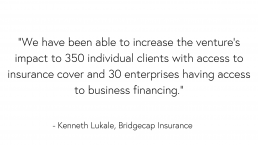
What does the future of your venture look like post COVID-19?
Surprisingly, our insurance has performed better than the previous years. So far, our services are available in over 100 medical facilities. We hope to keep this growth trajectory in the coming years by leveraging on technology. We are working tirelessly to ensure more people in low income areas are able to access good and quality health care by working with hospitals operating in those areas.
What are the key ingredients for successfully overcoming challenges?
A business owner must be “all in,” and willing to devote more than the typical 40 hours per week if they hope to succeed and be open to establishing business partnership. If sales and marketing are not your strong suit, reach out to someone who can advise you on the same.
How have you been able to pivot/adapt so fast in the face of a pandemic?
Throughout the crisis, the healthcare sector has been open and collaborative. The strongest leaders will continue to welcome support from partners and communities to deliver the best possible long-term care. We have been able to reach out to other regional hospitals to engage their patients in insurance conversations and adapt to taking up insurance covers. Bridgecap has also used the lessons learnt during the pandemic to meet future demand for Insurance and Advisory services
What is your advice to other entrepreneurs in regards to adapting/coping during a pandemic?
To always maintain good terms with everyone you work with and create a network in your field that can both help you transition to a new product and give you advice along the way.
I would also recommend an entrepreneur concentrating on the impact of a solution to one small problem and what revenue it will incur. Instead of going after the big problem right from the get-go, take incremental steps, innovating and modifying your prices along the way.
On a scale of 1-10 (1= unlikely and 10= very likely), how likely would you be to recommend other early-stage impact entrepreneurs to look to ygap for support to help grow their ventures? Also why?
I would give it a 9 because the strategy support they give ventures and the willingness to provide that link to experts to address specific venture challenges is valuable in developing future action plans.

Kenneth Lukale of BridgeCap Insurance
BridgeCap Insurance is a ygap Kenya 2020 Program alumni, and recently completed the ygap Re-Accelerator Program, designed to support ventures through the effects of COVID-19.
Venture Recovery Stories: Kahuto Pacific
Venture Recovery Stories: Kahuto Pacific
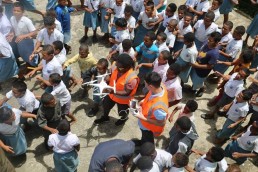
Kahuto Pacific are using drone technology to make a difference
Kahuto Pacific is an alumni venture of yher Pacific Islands. They exist to help companies, organisations, and government collect and transform data via GIS Mapping and drone technology to improve infrastructure, the environment, planning and much more. Through their technology they are able to survey in a couple hours what would take multiple survey crews a couple of weeks.
Kahuto Pacific is also helping to protect the Soga palm which is under threat of extinction in Fiji, using drones and GIS tools to help map this vital resource. The data captured will be used by Kahuto Pacific program partners to help implement more sustainable harvesting methods and empower farmers.
What are some of the challenges you have faced during COVID-19, in general as an entrepreneur and as a business?
Our operation was severely impacted with national lockdowns restricting movement around the country. In addition, our services were impeded by Fiji’s Civil Aviation Authority placing a halt on all flying not related to essential services. With our existing client base (loyal, returning Business to Business customers) also feeling the brunt of COVID-19, we experienced a stark decline in projects and cash flow. Amidst the uncertain landscape, it was challenging to maintain staff morale.
As an entrepreneur the biggest challenge was the uncertainty of everything around us, COVID19 – how long will it last? When will the borders open? How will the economy in Fiji be affected? What will the government do to assist Small and Medium Enterprises (SMEs)? So many questions, and not knowing the answers to all of them and trying to lead our company in this unique time was a huge challenge. We were constantly asking ourselves, should we close the business for the year 2020 to reduce our costs and spending and return next year? Therefore leading a team whilst trying to reassure yourself that everything will be okay is tricky and presents a challenge in itself. Also, since we’ve established our primary services after setting up the business COVID-19 made us think of how we would “pivot” or survive with our current services. The next challenge was then trying to decide what other services we could offer or how we could be supporting essential services.
How has your business changed or evolved due to COVID-19?
Thankfully Fiji has now entered a period of COVID-19 containment – restrictions have lifted considerably, allowing us to resume work.
COVID-19 initially seemed very gloomy and depressing for our business and I assume for many business owners. However, as we start to adjust to this “new normal” living with COVID-19, it has allowed our business to realign, reset and reboot ourselves through programs such as the ygap Re-Accelerator Program.
Our business now has a bit more clarity of what direction we wish to move forward in. We feel that COVID-19 has allowed us as business owners to evaluate our business, customers, and services and has made us better for it. Our business is evolving through a few of our services and has also evolved through getting re-started again after restrictions have eased.
In your own opinion, what is the most significant change that took place with your venture in the past 3 or 6 months?
As a business we’ve had to regroup and retarget our approach, particularly our marketing push – identifying new audiences and sectors, bolstering our brand, and amplifying our voice.
I definitely feel that the most significant change for our business is that we’ve had time (forced time during lockdown and the quiet period) to re-evaluate our business, identify areas that need the most attention and time. The Re-Accelerator Program has allowed us to focus on one of areas that we identified, especially online presence.
This process has allowed us as business owners to reset ourselves, and has given us more focus on the business than ever. So I think the change in mindset and being presented with the right tools, such as the program, has been the most significant change during the past 3 – 6 months.
Why was this particular change the most significant to you?
Given the uncertain times, it’s vital we diversify our customer base, secure alternative revenue streams and grow our reputation.
The change in mindset is allowing us to survive during this unique time and enabling us to discover news services and also focus on our areas of attention.
What role has ygap played in those changes and / or what are some outcomes your venture has achieved as a result of being supported by ygap and/or participating in the re-accelerator?
The Re-Accelerator Program is helping us enhance our brand and rejuvenate our online platform – a new website, improved content, a more holistic online marketing strategy and tactics.
This program has played a significant role in providing a platform not only to improve our online presence and branding but through the process of rejuvenating our online presence. It has reminded us of our ‘why’ and made our identity stronger and clearer.
The assistance provided through the program has been immensely helpful for us as business owners. It’s taken us back to the foundations of our businesses and has helped us make it a firmer foundation!
Since the program started we have been able to solidify our branding as a company, identify the best way to capture content for our website and explore many ways for improving our marketing.
I just want to emphasize that although the outcome of the program will be a new website and improving our online presence, the biggest outcome I will take from the program is it has allowed me to establish our why, and has made it clear for us on how to move forward.
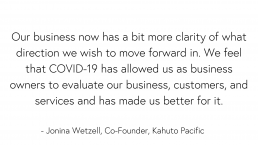
Is there anything you’re finding particularly enjoyable and/or valuable during the process?
The process has been simply amazing. It allowed us to identify our weaknesses and then it helped us strengthen a particular weakness. Being able to look at it from that point of view and then seeing the progress from the start has been great for myself. Talei has been absolutely outstanding and is so knowledgeable in this area, I feel very confident that we will achieve the outcome we want.
The 1 on 1 sessions are extremely beneficial as they allow us to share our thoughts and then worked with our scrambled thoughts and arranged it to make sense!
How do you see these outcomes improving your venture over the next 6-12 months?
Identity/Our Why
- Solidifying our identity through our branding and reminding us of our why will steer us in the right direction for our business. Having a clear vision of how we see ourselves as a company will then provide a clear path of where we want to go.
Online Presence/Branding/Website/Marketing
- The program has taught us so much and in particular of how we view our website and that it’s the hub of all our online presence. Knowing this will help us develop content and drive our online presence through our website. Our rejuvenated website will help us drive our quotes through the website and hopefully convert them to sales. That is the dream!
What does the future of your venture look like post COVID-19?
In terms of branding, we are much stronger now as who we are and how we present ourselves to our clients. Our future is still uncertain as we have no idea how long COVID-19 will last and when we move into “post COVID!” – but we feel somewhat confident that through focusing on our branding and making certain pivots, we will be able to survive!
Do you have any advice you’d like to offer other entrepreneurs in regards to adapting/coping during a pandemic?
It’s all in the mindset!
How likely would you be to recommend other early-stage impact entrepreneurs to look to programs like ygap for support to help grow their ventures? Also why?
100%
ygap focuses on the process and encourages you to think of your WHY? Knowing and identifying this brings clarity of how you will move forward as an entrepreneur.

Kahuto Pacific is a yher Pacific Islands alumni, and recently completed the ygap Re-Accelerator Program, designed to support ventures through the effects of COVID-19.
To learn more about Kahuto Pacific, head to https://www.kahutopacific.com/
Venture Recovery Stories: Sibocali
Venture Recovery Stories: Sibocali
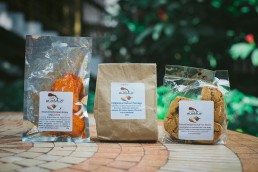
Some of the indigenous root vegetable products made by Sibocali
Sibocali is an agribusiness that manufactures a variety of edible products, such as crisps and porridge, that are made from indigienous South African root vegetables. The business works with rural women, where they teach them how to grow and harvest the vegetables that the venture uses in the production of its products.
Behind Sibocali is Sibongile Mtsabe, a local entrepreneur from a community in the KwaZulu Natal province of South Africa. Sibocali was selected for the 2020 ygap South Africa Re-Accelerator program.
What are some of the challenges you have faced during COVID-19, in general as an entrepreneur and as a business?
One of the first challenges was that our sales went down. Our usual processing facility was not available to us so we got a temporary one which was locked up later because those who we were sublet to were summoned to pay the rent balances for past months of lockdown, and they weren’t able to. We started looking for a space to install a container and looking for new clients as there were slow sales in retailers where we distribute. We didn’t have online platforms like Ecommerce or a website so we advertised on social media, but without a website people didn’t trust us hence there were barley sales.
We found a potential buyer, but they needed us to upgrade our space with industrial equipment so we could gain confidence with bigger retailers, like Amazon and Take a lot, which requires us to meet national standards in order to grow to international standards to gain a greater market share. We also experienced delays when applying for different types of support in different offices and the excuse was COVID-19.
How has your business changed or evolved due to COVID-19?
In the midst of sales slowing down, we got some clients that we did not expect, like the Pick n Pay Berea store. They gave us a chance to supply our crisps. We also got an assurance from our support at ygap to get a functional container that we will use as a mini factory.
We secured a space to set up our cargo container at KwaMashu Park and we are also getting more promises to get space which gives us an advantage. We have evolved; they say challenges help one to grow, and we have new products that we would have delayed producing if it was not for the COVID-19 challenges.
What has been the most significant change that has taken place over the past few months?
There are a couple of key changes; getting additional products in our range, support to sell online through ECommerce, getting a new working space, and linking with international potential buyers.
Another change was that the Kenyan Economic Development Department invited us to become suppliers. Fortunately, we had some of the products they needed and in short there is the potential of new markets opening for us. Despite the challenges, the business has grown all round.
Why were these particular changes the most significant to you?
It gave me joy to see the growth of the business, and though it has been challenging, this means more people will be impacted. Our economy will grow because we will soon need more suppliers and as a result there will be more job opportunities opening soon as we expand. Rural and township communities will soon be able to increase their income, especially through growing and supplying new produce to us.
What role has ygap played in helping your venture through those changes and what are some outcomes your venture has achieved as a result of participating in the ygap South Africa Re-Accelerator Program?
ygap played a great role in supporting us during trying times. We got a small grant that helped us to purchase the instant yam mash or instant stiff pap we needed for manufacturing, and we managed to get the place we temporarily worked in conducive to smooth processing. We will also get a container that will solve our pressing challenge of needing a working factory, and ygap will help us to link with people who will help us to recycle our waste for power generation and this will increase our profits. They are also assisting us to set up an ecommerce website. Sharing with other entrepreneurs through the ygap Re-Accelerator Program is helping us to think and revise the way we do business, and the ygap team is consistently checking up on us which keeps us motivated. ygap has helped us to stay afloat through the advice they shared.
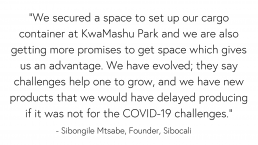
How do you see these outcomes improving your venture over the next 6-12 months?
The business has made links, meaning that new relationships have been ignited and we will maintain them and grow from them as we become better and bigger. We aim to build and grow a strong database of skilled farmers. As our standards have improved through the challenges of COVID-19, we hope to draw in new customers.
What does the future of your venture look like post COVID-19?
It looks bright and promising
What are the key ingredients for successfully overcoming challenges?
Never give up on your dreams, and when one thing is not working try something new using the same resources or additional resources to make things work. Pivot your business, there is always a way out.
What is your advice to other entrepreneurs in regards to adapting/coping during a pandemic?
Never give up in trying times, when things are getting tough it is a training for one to be innovative and think more on how to improve. Challenge your mind and your spirit to give better solutions. Focus on the prize and close the ears to noise called challenges. Remember that tough times don’t last but tough people do.
On a scale of 1-10, where 1 is unlikely and 10 is very likely, how likely would you be to recommend other early-stage impact entrepreneurs to look to ygap for support to help grow their ventures?
10 = very likely. I will recommend other entrepreneurs’ startups to ygap because they will learn how to find the roots of why they are doing their business. The discovery of why they do what they do will help them to derive a good strategy and move their business forward while impacting their communities.
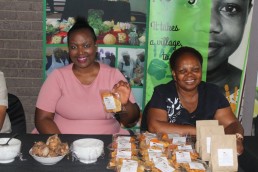
Sibocali is a ygap South Africa alumni, and recently completed the ygap Re-Accelerator Program, designed to support ventures through the effects of COVID-19.
Venture Recovery Stories: Robofun
Venture Recovery Stories: Robofun
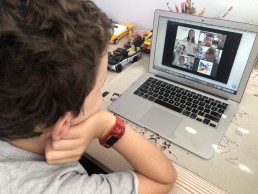
Transitioning to online learning has been both challenging and rewarding for Robofun
Robofun designs and runs tailored workshops to inspire and attract primary school girls to participate in STEM and familiarise young boys to work with girls in the lab. The programs offered cover coding, robotics and 3D design at multiple levels. In light of COVID-19, Robofun was able to reimagine its services to the online world by running virtual classes during the school holidays.
Lina Qasem, founder and managing director of Robofun said, “We’ve had to improvise in order to ensure our classes continue to run. This required us to pivot our business model to allow for 100% online remote and interactive learning. While it was very challenging to execute in such a short period of time, the feedback has been great, and we know parents needed this service.”
The ygap First Gens team spoke with 2018 First Gens alumni and founder of Robofun, Lina Qasem about some of the challenges and opportunities arising from the pandemic, how ygap has supported Robofun through the re-accelerator and Robofun’s vision for a world beyond COVID-19.
What are some of the challenges you have faced during COVID-19, in general as an entrepreneur and as a business?
As a business, we previously had lots of partnerships with places such as libraries, schools, museums etc. However, as a result of the pandemic, many of these places closed and we were unable to run our workshops in person.
As an entrepreneur, it can be challenging trying to run a business from home whilst looking after a family and I experienced many pressures as a result of that. I had to change our business model completely and this was hard. However, with the support of my team, I was able to figure out the priorities for Robofun and focus on our online workshops and to postpone our partnerships to ensure our online workshops are successful.
How has your business changed or evolved due to COVID-19?
Robofun has quickly pivoted by moving our physical workshops to an online format. We couldn’t do the robotix classes in person so we had to pivot online and find the best software to simulate our robotix classes.
Some parents weren’t comfortable or familiar with registering their kids to participate online. However, after 1-2 months, our classes became full as parents became used to online learning and registered their kids to participate in our workshops.
We changed the format by offering our partner schools and libraries with different options for online classes with various prices to make it flexible for them. As we understand that it is a challenging time for many businesses, we also began offering promotional discounts for our partners to access our workshops. For example, if you buy two classes, you get one free.
Additionally for parents, we also offer one- off classes so they don’t have to purchase or register for bulk classes.
In your own opinion, what is the most significant change that took place with your venture in the past 3 or 6 months?
I’m happy because the most significant change to Robofun is that now we are offering classes globally. We have children from Japan, children from the United Arab Emirates and from different states around Australia. Before, we used to only offer classes to Melbourne, now we can offer our program to everyone.
Why was this particular change the most significant to you?
This change is most significant because it will increase our impact to reach more girls around the world to learn and engage with STEM. Most kids who have registered are girls. This is great because we have access to a bigger market and most children who participated in our workshops have provided positive feedback.
When we reach more kids and increase our impact, this will help us to run more workshops and hire more people to run them and increase employment opportunities.
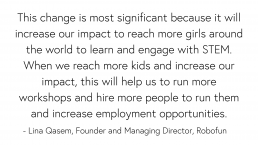
What role has ygap played in those changes and / or what are some outcomes your venture has achieved as a result of being supported by ygap and/or participating in the re-accelerator?
ygap has been so supportive and with their immediate help, we were able to go through this journey confidently. In the beginning, when we’re juggling different things, it’s good to have someone to hold you accountable, to let you know that we’re on the right track and to provide reassurance. During the re-accelerator, for the financial session, it helped me a lot and I found it useful because it showed me how I can minimise costs and increase my impact without spending more money. I also found the marketing session useful to promote our online classes and show to our audience that we’re still operating.
The re-accelerator helped us to not feel alone and helped us to see other ventures are going through a challenging time too. We felt supported.
How do you see these outcomes improving your venture over the next 6-12 months?
These outcomes can help my venture in going ahead confidently, knowing there is a supportive team who I can rely on for any help. The next six months are uncertain, however, I know that we’ve gone through the worst and now, it’ll be easier to get through it with a supportive team and supportive coaches to ask for help.
What does the future of your venture look like post COVID-19?
Robofun will keep offering our classes globally. We will keep running online classes and hopefully it’ll be the first option for anyone who is interested in learning about STEM.
What are the key ingredients for successfully overcoming challenges?
Consistency, perseverance, keep trying and keep going until it works and being willing to ask for help. Also, believe in yourself and if you have this passion towards your venture, you will be able to overcome challenges, and keep focused. To keep focused, you need to stay motivated and find what keeps you motivated.
What is your advice to other entrepreneurs in regards to adapting/coping during a pandemic?
Just ask for help and stay motivated. Motivation will keep you going and wanting to give back to the community. Also look after yourself so you can give back to the community.
How likely are you to recommend other early-stage impact entrepreneurs to look to programs like the one ygap has run for support to help grow their ventures? Also why?
I can confidently recommend such a program, because ygap has been really helpful and has a supportive community to help you to keep moving forward and develop the confidence to know what you’re doing and go on the right track.
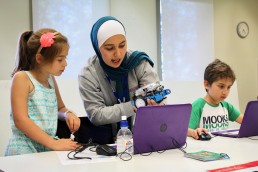
Robofun is making STEAM education accessible and fun. For more information, check here: https://www.robofun.com.au
Robofun is a ygap First Gens alumni, and recently completed the ygap Re-Accelerator Program, designed to support ventures through the effects of COVID-19.
Founder Resiliency Stories: Wizkit
Founders Resiliency Stories:
Wizkit
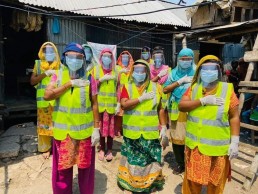
Bangladesh front-line workers wearing protective face masks manufactured by Wizkit.
In Bangladesh, there is a significant lack of basic medical equipment and protective gear for the country’s healthcare and front-line personnel to help fight and protect against COVID-19.
In response, ygap Bangladesh alumni venture, Wizkit, has connected with an international community of open source COVID-19 technology and have worked to recreate those designs in Bangladesh. Repurposing its product development and research teams, Wizkit is now 3D printing face shields, ear savers and have started to prototype a quick emergency ventilator.
“Our 3D printed face shields have now helped 1700 doctors and front line personnel to stay safe. 500 more are rolling out as we speak. Additionally, each day we are averaging printing 120 face shields and ear savers to support medical professionals” ygap Bangladesh alumni and Wizkit co-founder, Mushfiqur Rahman Saad, said.
The ygap Bangladesh team spoke with Wizkit’s co-founder, Mushfiqur Rahman Saad about the impact of the pandemic on their venture, how they are responding, and their vision for a world beyond COVID-19.
How has COVID-19 affected Wizkit?
Due to COVID-19, all our activities which required a heavy amount of logistical support initially stopped to a halt. Our research team had a difficult time initially adapting to not being able to work together in a single space with their equipment, and this directly impacted our sales and revenue. Our production and research involves a lot of moving around with materials and contents, so all our logistic functions were temporarily stopped.
What support is Wizkit providing to those affected by COVID-19?
After the initial shock we decided we wanted to help in any way we could. We connected with an international community of open source COVID-19 technology and worked to recreate those designs here in Bangladesh. Doctors and emergency personnel in Bangladesh lack basic medical equipment and protective gear, so we started 3D printing face shields, ear savers and started to prototype a quick emergency ventilator.
Our 3D printed face shields have now helped 1700 doctors (free of charge) and front line personnel to stay safe. 500 more are rolling out as we speak. Additionally, each day we are averaging printing 120 face shields and ear savers to support medical professionals. Our ventilator is also entering medical trials and we have ramped up all of our production capacity sixfold from the time we started.
All our 3D printed and other materials are now being sold at a fraction of any low end alternative in the market with a minimal margin to keep operations running. We have also created custom disinfection chambers that are now being set up across multiple factories (with a huge amount of employees, like RMG factories) and hospitals around Bangladesh for instant disinfection.

What are the key ingredients for overcoming challenges?
For us what worked best is our personal sources and very strong supply chain which was able to serve us despite a complete lockdown. It also helps to keep the team completely focused on a “problem-solving” mentality all the time, that way everyone is always on board with what’s happening and how they can be handled.
How have you been able to adapt so fast in the face of a pandemic?
Our team believed that we could help. We used all of our resources from every possible place and person, everything at hand and used the international open source communities as a way to inspire action. Well-trained employees who believe in our mission (to make lives better), as much as I do as a co-founder, keep the team trying out new ideas and keep them going even from home.
What does a post COVID-19 world look like for Wizkit?
Post COVID-19, we would like to make a few changes within the organization, so that we can be better prepared for any such future emergencies. Additionally post COVID-19 our venture will thrive with an even stronger supply chain. but in general our venture was made to adapt fast and so that in its core will remain the same.
Wizkit is an educational technology company empowering youth involvement in STEM through research, innovation, product development and training. For more information, check out Wizkit’s website here: https://www.wizkit.org/
Wizkit was a participant in the ygap Bangladesh 2016 Program.
Founder Resiliency Stories: Safe Motherhood Alliance
Founders Resiliency Stories:
Safe Motherhood Alliance
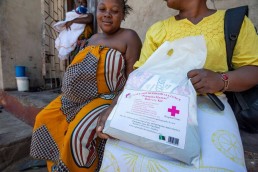
A family in Zambia holds one of Safe Motherhood Alliance’s baby delivery kits.
COVID-19 has shown its potential devastating impact around the world, but it is a particular cause for concern throughout Africa as it could have disastrous impacts on the continent’s already strained health systems, quickly turning into a social and economic emergency.
In response, yher Africa alumni venture Safe Motherhood Alliance is continuing to manufacture and distribute emergency baby delivery kits for home births while also pivoting to manufacture 3D printed face masks and visors, and distributing other essential medical supplies across COVID-19 hot-spot zones throughout Zambia.
“Our target is to distribute 5,000 baby delivery kits to 5,000 pregnant women and train 100 traditional birth attendants during this period as part of our ongoing services as COVID-19 puts an already overburdened health system under immense pressure.” yher Africa alumni and Safe Motherhood Alliance’s CEO, Muzalema Mwanza remarked.
The yher Africa team spoke with Safe Motherhood Alliance’s CEO, Muzalema Mwanza about the impact of the pandemic on their venture, how Safe Motherhood Alliance is providing emergency maternity care and distributing health products for expecting mothers across Zambia, and their vision for a world beyond COVID-19.
How has COVID-19 affected Safe Motherhood Alliance?
Due to COVID-19 being highly infectious, obstetric providers are having to reinvent maternity care in real time to protect the mother, baby as well as themselves. As face-to-face encounters in health facilities are being discouraged, it’s more important than ever to ensure the safety of the mother, the newborn and especially health personnel to avoid transmissions of the virus to newborns during childbirth in resource-constrained areas. Last mile health services in current situations are usually underfunded and under-resourced, leaving the virus to spread easily in these communities, and pregnant women are more at risk. The health facilities do not have enough face masks and visors to prevent the spread in the already overburdened health facilities. From what we’ve seen with the incubation of the virus, symptoms start when one has already become infectious to the general population.
With our work in the field, we are seeing in real time how health personnel and some of our own staff members do not have adequate supplies of PPE. We have realized that we have a deficit of masks to the point that medical personnel are also at risk of contracting the virus and are concerned about the burden they will bear in the next few months when the crisis reaches its peak.
What support is Safe Motherhood Alliance providing to those affected by COVID-19?
Zambia, as with the rest of the world, is ill prepared for this crisis with a deficit of face masks, ventilators and mass testing that could help mitigate this crisis before it reaches its peak. In addition, COVID-19 dangerously affects pregnant women which is our area of expertise as our organization is responsible for ensuring that pregnant women have a safe childbirth.
Our focus on pregnant women and trained birth attendants during the COVID-19 pandemic is vitally important because experience tells us that during health crises like the spread of the coronavirus: women are more likely to be infected, given their roles as caregivers and frontline healthcare workers (70% of them are women) and sexual and reproductive health resources are diverted, contributing to higher maternal mortality rates.
in response, we are raising funding that will help us procure medical supplies of essential products for the readiness package to be deployed across the COVID-19 hot-spot zones and epi-centre in Lusaka, the capital city of Zambia, to train more frontline health workers already in our database. We will ensure they have adequate PPE and emergency kits for home births specifically for the baby delivery kit that includes medical supplies such as sterile gloves, surgical blades and delivery mats, and manufacturing 3D printed face masks and visors locally in Zambia to reduce costs and mitigate disruption to our supply chain.
We also intend to provide contact tracing in communities for those who test positive for COVID-19 especially for post-birth analysis in pregnant women. This is a practical solution that can be managed locally, relieving pressure from national facilities who would struggle to cope under sustained pressure. Our target is to distribute 5,000 baby delivery kits to 5,000 pregnant women and train 100 traditional birth attendants during this period as part of our ongoing services as COVID-19 puts an already overburdened health system under immense pressure.

What have been the challenges you’ve faced?
One of the challenges we have faced during this period is finding resources and funding for our business to adapt quickly enough to COVID-19 as it is moving at an exponential rate. This is a concern because we know that pregnancy changes the immune system of the woman making her more vulnerable to infectious diseases, hence more susceptible to a virus of COVID-19’s nature. So we want to work quickly.
Our primary customers, who are pregnant women are depending on us even more now with travel restrictions, social distancing and other issues brought on by the pandemic, so we want to ensure we are able to support them during this process. Pregnant women are being advised not to go to the health facilities, because of COVID-19 for safety and are encouraged to have home births. However, without access to sterile tools and a trained birth attendant, we could see the number of neonatal and maternal mortalities start to rise in the coming months or weeks.
What are the key ingredients for successfully overcoming challenges?
One of the key ingredients for successfully overcoming challenges is having a strong sense of why you are doing something, because that is what will hold you to be steadfast even when things are not going your way. Also, realising that success is a process and not an event, that way you are continuously learning and growing as an entrepreneur and a leader in your organisation. But first you have to learn to lead yourself, into the right spaces, to make the right decisions for yourself, because no one knows better than you what you need to succeed and you have it all inside you. You just have to believe in yourself and your abilities.
How have you been able to adapt so fast in the face of a pandemic?
From the onset of the COVID-19 pandemic and when I saw the devastating effects it had on the rest of the world, I realised that this was the new normal and we had to adapt to it. So we set in motion, a clear road map of how we wanted to do that and reached out to our partners so they knew what we were planning. So planning and reacting to the situation accordingly did help and, of course, there were times when I felt that it was all too much especially hearing the stories of what was happening around us. But that’s where we need a good support system who knows and knows your strengths and weaknesses so that you can depend on that system in times of uncertainty.
What does a post COVID-19 world look like for Safe Motherhood Alliance?
We are continuing to work during the pandemic delivering our health services and are hopeful that we will continue to do so for a long time, because the need is still there and heightened now due to COVID-19. We are working on ways to deal with it and take care of our staff, families, customers and communities. Despite all the bad news that we hear about the pandemic, there are also stories of hope, stories of people coming together and finding their “Ubuntu” and joining hands to help a neighbour struggling with something or even a complete stranger because they recognise that “this too shall pass”. And yes, the numbers of those we have lost to the pandemic keep rising everyday, but I am optimistic about the future of humanity. So I know our venture will adapt or even pivot to ensure it is future ready proof and we will continue serving the mothers out there, because we are here to support them during pregnancy and childbirth to have healthy babies.
Safe Motherhood Alliance develops and distributes health products to pregnant women from low-income communities and rural areas. We also train and equip local women from the communities who are traditional birth attendants to serve as frontline health workers.
Visit Safe Motherhood Alliance website here.
Safe Motherhood Alliance was a participant in the yher Africa 2018 Program.
Founder Resiliency Stories: Project Trishna
Founders Resiliency Stories:
Project Trishna
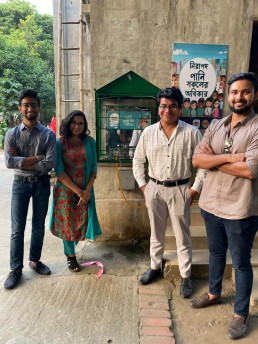
Founders of Project Trishna, an initiative of the Footsteps Foundation
The spread of COVID-19 and the associated government response in Bangladesh has resulted in millions of people becoming unemployed with marginalised community groups such as poor women and other minorities being most impacted.
In response, ygap Bangladesh alumni venture, Project Trishna, initiated an emergency relief response, providing relief packages including essentials such as rice, lentils, salt, cooking oil, potatoes and antiseptic soap, specifically for the most marginalised members within society. Already 157 individuals and 571 families across 13 unions have accessed these much-needed relief packages who would not otherwise receive any other support.
“One of the communities in Khulna City reached out to us two weeks after their aid distribution to refer to nearby communities that needed help, and actively came forward to engage in aid distribution efforts because after seeing our response, they were inspired to do their part for their community” said the team of Project Trishna, an initiative of the Footsteps Foundation Bangladesh.
The ygap Bangladesh team spoke with the team of Project Trishna about the impact of the pandemic on their venture, how they are responding and their vision for a world beyond COVID-19.
How has COVID-19 affected Project Trishna?
Due to COVID-19, almost all of Project Trishna’s activities have had to be put on hold.
It has been impossible to carry out regular monitoring of our site and installations, as well as servicing visits by our logistics teams. Due to schools being declared closed until September 2020 by the government, our existing systems will remain unused till the end of that period.
The closure is hindering our scope for new implementations and has put businesses into an uncertain economic period, thereby reducing our scope of prospective CSR (Corporate Social Responsibility) partners.We have also been unable to import system components as these products are imported from Taiwan and China. Finally, our revenue sources have dried up and our runway is decreasing given our current burn rate and lack of new income.
What support is Project Trishna providing to those affected by COVID-19?
We introduced an emergency relief response at the beginning of the lockdown in Bangladesh. This was to address the number of essential workers who did not have access to work throughout the lockdown period and could not afford basic food for themselves and their families. This support was provided to communities who are under the scope of Project Trishna, as well as low-income communities outside Dhaka. We focused on the highly marginalised and stigmatised members of society who were being overlooked by mainstream aid distributions efforts. This included women in prostitution and members of the LGBTQ+ and Hijra communities. We provided food packages containing rice, lentils, salt, cooking oil, potatoes, and a bar of antiseptic soap.
This is important because most of Bangladesh’s labour force is suffering due to lack of work and cannot access essentials such as food and soap. As we are unable to carry out operations in terms of Project Trishna, we have opted for an emergency response and thus far have reached 157 individuals and 571 families across 13 unions (administrative geography) .
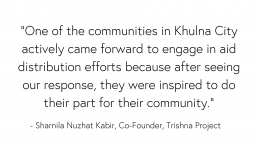
What have been the challenges you’ve faced?
As an entrepreneur, the uncertainty surrounding business, job and income security are some of the challenges I’ve faced. As a business, and in relation to our COVID-19 response, it has been hard to mobilise due to lockdown, insufficient donations and insufficient knowledge.
What are the key ingredients for overcoming challenges?
Our key ingredients are embracing self-awareness regarding the crisis and crisis response, using time to our advantage in thinking out of the box or remodelling approaches, implementing a discipline oriented approach towards uncertainties and unforeseen future and engaging in creativity, exploring new methods, and spending time on creative solutions.
How have you been able to adapt so fast in the face of a pandemic?
Coordination and cooperation from the team, with all hands on deck. We have been able to brainstorm and creatively adapt to the scenarios as it happened.
What does a post COVID-19 world look like for Project Trishna?
For Project Trishna, community-based mobilisation is essential in achieving project outputs and long term outcomes. While the government has ramped up hand-oral hygiene (in light of COVID-19), access to clean drinking water is still a problem. Our project stance will now look into developing new community guidelines in our post-crisis activities.
Project Trishna supports the Bangladesh government’s commitment towards SDG 6, particualry SDG 6.1, access to safe drinking water. For more information, check here: https://www.footstepsbd.org/
Project Trishna was a participant in the ygap Bangladesh 2019 Program.
Founder Resiliency Stories: Motupa Enterprises
Founders Resiliency Stories:
Motupa Enterprises
Puleng Motupa, Founder of Motupa Enterprises.
COVID-19 has wreaked havoc on small businesses throughout South Africa with the country implementing one of the world’s strictest lockdowns. However, for ygap South Africa alumni, Motupa Enterprises, COVID-19 has created a unique opportunity for the venture pivoting from manufacturing cloth constructed slow-cookers to producing cloth face masks, positioning themselves as an essential product provider and thus enabling them to continue to trade during the lockdown period.
“4856 people are currently using my masks to prevent COVID-19 and that makes me the happiest young entrepreneur ever!” remarked Motupa Enterprises founder, Puleng Motupa.
The ygap South Africa team spoke with Motupa Enterprise CEO and founder, Puleng Motupa about the opportunities that have emerged out of COVID-19 and how Motupa Enterprises has responded to these emerging opportunities.
How has COVID-19 affected Motupa Enterprise?
COVID-19 has created new opportunities for Motupa Enterprise. Using the same materials that we use for our slow cookers, we’ve introduced cloth face marks. By introducing a new product, we’ve seen an increase in sales and have already sourced an international client in the healthcare industry. We’ve been able to re-position ourselves as an essential product provider enabling us to continue to trade during South Africa’s COVID-19 lockdown period.
What support is Motupa Enterprise providing to those affected by COVID-19?
As a business that is manufacturing cloth face masks, we are providing essential products in helping to stop the spread of COVID-19. Since April, we have sold over 4000 masks across three provinces in South Africa and have sold 1000 masks to France. As a result, Motupa Enterprise is well positioned to experience growth during these very difficult times.
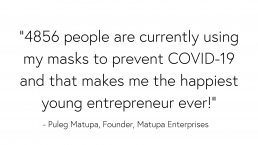
What have been the challenges you’ve faced?
With orders coming in from across the country, we’ve experienced distribution challenges because of the distances. To meet the growing demand for face masks, we’ve requested support from the government to help deliver our product to different provinces in the country, but to no avail. So we’ve had to focus on building our own business and are now looking to partner with courier companies that are able to operate during the lockdown to help us supply the growing demand for our product across the various regions of the country.
What are the key ingredients for overcoming challenges?
It’s a combination of a number of things. It’s the pursuit of a passion and the drive to make a positive impact in the world. It’s the ability to create new things and respond to opportunities that emerge.
How have you been able to adapt so fast in the face of a pandemic?
With the COVID-19 pandemic and lockdown, SMMEs across South Africa are faced with a lot of challenges. It is up to business owners to either become the fish or the shark of the ocean. I want Motupa to be a shark and have the ability to adapt in every situation. For us, COVID-19 has brought new opportunities, new product lines, and a widened customer base. Using key materials from a different product line, Motupa has pivoted its business model and introduced cloth face masks which are now mandatory for all South Africans when in public.
What does a post covid-19 world look like for Motupa Enterprise?
It looks like an ocean filled with lots of fish to catch! It will be full of opportunities.
Motupa Enterprise manufactures non-electric, cloth-based slow cookers that cook food without the use of electricity, fire, gas or solar power. They also use the offcuts to manufacture cushions and pillows. Visit Motupa Enterprise Facebook page here.
Puleng Motupa was a participant in the ygap South Africa 2019 program.

